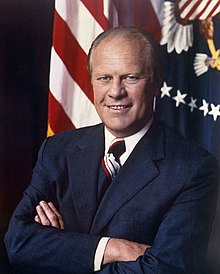
Back رئاسة جيرالد فورد Arabic Kabinett Ford German Gerald Fordin hallitus Finnish Présidence de Gerald Ford French הקבינט של ארצות הברית בממשל ג'רלד פורד HE Presidenza di Gerald Ford Italian Kabinet-Ford Dutch Президентство Джеральда Форда Ukrainian
 | |
| Presidency of Gerald Ford August 9, 1974 – January 20, 1977 | |
| Cabinet | See list |
|---|---|
| Party | Republican |
| Election | None |
| Seat | White House |
|
| |
| Library website | |
Gerald Ford's tenure as the 38th president of the United States began on August 9, 1974, upon the resignation of President Richard Nixon, and ended on January 20, 1977. Ford, a Republican from Michigan, had been appointed vice president on December 6, 1973, following the resignation of Spiro Agnew from that office. Ford was the only person to serve as president without being elected to either the presidency or the vice presidency. His presidency ended following his narrow defeat in the 1976 presidential election to Democrat Jimmy Carter, after a period of 895 days in office. His 895 day presidency remains the shortest of all U.S. presidents who did not die in office.
Ford took office in the aftermath of the Watergate scandal and in the final stages of the Vietnam War, both of which engendered a new disillusion in American political institutions. Ford's first major act upon taking office was to grant a presidential pardon to Nixon for his role in the Watergate scandal, prompting a major backlash to Ford's presidency. He also created a conditional clemency program for Vietnam War draft dodgers.
Much of Ford's focus in domestic policy was on the economy, which experienced a recession during his tenure. After initially promoting a tax increase designed to combat inflation, Ford championed a tax cut designed to rejuvenate the economy, and he signed two tax reduction acts into law. The foreign policy of the Ford administration was characterized in procedural terms by the increased role Congress began to play, and by the corresponding curb on the powers of the president.[1] Overcoming significant congressional opposition, Ford continued Nixon's détente policies with the Soviet Union.
In the 1976 presidential election, Ford was challenged by Ronald Reagan, a leader of the conservative wing of the Republican Party. After a contentious series of primaries, Ford narrowly won the nomination at the 1976 Republican National Convention. In the general election, Ford lost to Carter by a narrow margin in the popular and electoral vote. In polls of historians and political scientists, Ford is generally ranked as a below average president, much like both his predecessor and successor.[2]
- ^ George Lenczowski (1990). American Presidents, and the Middle East. Duke University Press. pp. 142–143. ISBN 0-8223-0972-6.
- ^ "Presidents ranked from worst to best: 25. Gerald Ford (1974-1977)". cbsnews.com. CBS Interactive. Retrieved October 29, 2018.
